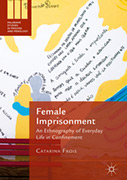Female Imprisonment: An Ethnography Of Everyday Life In Confinement

Author: Catarina Frois
Publisher: Cham, SWIT: Springer International – Palgrave Macmillan, 2017. 231p.
Reviewer: G.S. Rekha | November 2020
Exploring inmates’ lives before and after they have committed a crime is important for any works otherwise focused on the prison context. Female Imprisonment: An Ethnography of Everyday Life in Confinement, written by Catarina Frois, highlights this as one of the keys to success in the study of inmates’ lives in the prison. Overall, this book is well organised and well written, with nine chapters, including an introduction and conclusion.
In the first chapter, Frois introduces the reasoning behind her research in Odemira prison, which is a female prison in Portugal’s south-western region. Frois explains her justification for conducting ethnographic research in Odemira, despite the fact that it is atypical, given its relatively small size and poor conditions when compared to other prisons in Portugal.
In chapters 2 and 3, Frois describes the penitentiary system in Portugal, and more specifically presents the history of Odemira prison. She explains the transformation of Odemira into a prison having the capacity to accommodate inmates with small children in their care.
Chapters 4, 5 and 6, are central to understanding the unspoken reality of day to day life in the prison, describing how inmates spend their days, as well as their relationships with other inmates. One gets a sense of the moral behaviour of the inmates, and about how some have suicidal thoughts, but also about their hopes for the future. While these chapters focus on life in confinement, chapters 7, 8 and 9 focus on the inmates’ childhood experiences that have been carried forward into their adult lives. Here one sees the common issues that the inmates have faced up until the time when they were arrested.
The author concludes by pointing out that the prison is actually its own society, and that what is found in the prison is much the same as what we see in the larger society. Catarina Frois presents a high quality empirical and qualitative work dealing with life in confinement, but also helps the reader understand more fully by focusing on the inmates’ lives, both before and after they committed the crime which brought them to the Odemira Prison.


